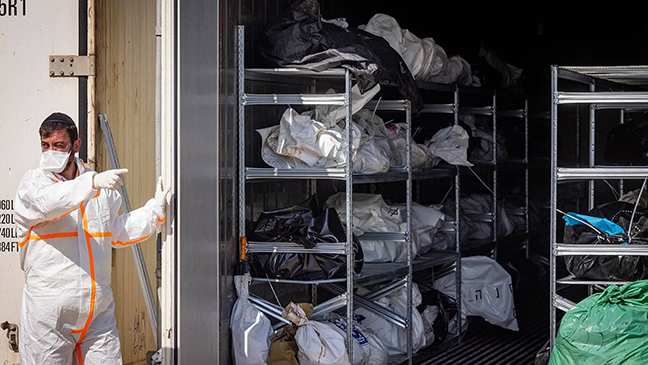ZAKA, Israel’s disaster response, holding community event in Metairie

ZAKA personnel and Israeli soldiers at the forensic center in the Shura military base near Ramle, where hundreds of dead bodies arrived after Hamas’s Oct. 7 massacre, Oct. 13, 2023. Photo by Nati Shohat/Flash90.
New Orleans knows all too well that when disaster hits around the world, ZAKA shows up. On June 5, ZAKA will return to New Orleans — but for a community event, not for a rescue mission.
Founded in 1995, ZAKA is Israel’s non-governmental rescue and recovery organization, with over 3,000 volunteers ready to respond at a moment’s notice to any attack, accident or disaster.
ZAKA is the acronym for disaster victim identification in Hebrew. In Israel, they have sole responsibility to deal with incidents of “unnatural death,” such as from terror attacks. They work with emergency services and security forces to search for survivors, and ensure that the dead are handled with respect, a mitzvah of the highest order because the deceased has no way to repay the kindness.
In addition to working in Israel, an international team is ready to be dispatched to major mass casualty incidents. The ZAKA International Rescue Unit works in close cooperation with Israel’s Foreign Ministry, the IDF and other government bodies.
Keynote speaker for the Metairie event will be Simcha Greiniman, deputy commander of ZAKA Modi’in Illit. On Oct. 7, he was in the synagogue when he heard news of the Hamas attack. He and his team rushed to the scene to help, but there was nobody to assist. For two weeks, he and his team went through the kibbutzim along the Gaza border, caring for the deceased.
Greiniman was appointed by the Israeli government to oversee the collection of human remains from Oct. 7. Because of the Jewish practice of burying bodies as intact as possible, ZAKA members comb disaster areas and attack scenes to make sure no remains are overlooked or discarded improperly.
Moshe Rozenberg, executive director of ZAKA USA, will also speak.
According to Marc Nadelman, ZAKA director of development, since Oct. 7 ZAKA volunteers have worked “to the point of physical and psychological exhaustion.”
Professor Rony Berger of Tel Aviv University, who has studied and worked with ZAKA volunteers for years, told the New York Times “They see so many bodies, and work so directly with human bodies that have been torn apart, that they are all psychologically impacted.”
Nadelman said many volunteers have already been in and out of psychiatric wards. “We don’t know how many more there will be. Nor do we know how many are suffering in silence… ZAKA is committed to its volunteers being properly equipped and to their psychological wellbeing.”
New Orleans Connection
In 2005, ZAKA was recognized by the United Nations as an international volunteer humanitarian organization, citing its work at the scenes of terror attacks in Mombasa, Istanbul and Taba, recovery of remains from the Space Shuttle Columbia disaster, and natural disasters such as a tsunami in Southeast Asia and the levee breach in New Orleans.
The New Orleans operation was led by Isaac Leider, ZAKA coordinator in New York City. After Hurricane Katrina and the levee breach at the end of August in 2005, a ZAKA team went to New Orleans and was escorted by Louisiana National Guard members, and worked under the command of Louisiana police.
Among ZAKA’s tasks was ensuring that the bodies of Jewish victims of Katrina were treated according to Jewish law.
The most famous part of their time in New Orleans was the Sept. 13 visit to still-flooded Beth Israel, two weeks after the storm, where Leider waded through waist-deep murky waters in the Beth Israel sanctuary to retrieve the waterlogged Torahs from the ark. A photo of the rescue ran in Jewish publications worldwide and became a focal image for Jewish efforts to help New Orleans rebuild.
Those Torahs were later buried at the Beth Israel cemetery, alongside long-time gabbai Meyer Lachoff, who died at a nursing home in Baton Rouge just after the storm.
After the floodwaters finally receded, Beth Israel’s building was unusable, so they started meeting at Gates of Prayer — an Orthodox congregation housed at a Reform congregation, part of the “all in this together” mentality of transcending labels that took hold after the storm. Eventually, Beth Israel rebuilt next door to Gates of Prayer, and the ZAKA event will be at those two congregations.
The event will have an emphasis on Yom Yerushalayim, the day celebrating the reunification of Jerusalem in 1967.
At 6 p.m., there will be a VIP reception for donors. At 7 p.m., there will be a free community event at Gates of Prayer. For security reasons, registration is required for both events.
The community gathering will be led by Arnie Fielkow, former CEO of the Jewish Federation of Greater New Orleans. State Senator Cameron Henry will speak, along with Rabbi David Gerber of Gates of Prayer, and Rabbi Phil Kaplan of Beth Israel.
Tickets to the VIP reception are $180. Sponsorships are $3600 and include eight tickets to the VIP reception. The community event at Gates of Prayer is free, there will be an opportunity to donate to ZAKA during the evening.



